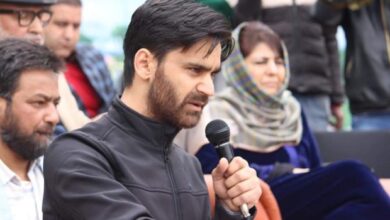Kashmir’s Digital Dilemma: Social Media vs. Intellectual Growth

Azra Mufti
As someone who grew up in a generation less saturated with social media, I often feel fortunate to have lived through a time where education, focus, and personal development took precedence over the constant need for digital validation. Our lives weren’t intertwined with the bombardment of social media content, and distractions were few. Today, however, it seems that the younger generation, particularly here in Kashmir, has become increasingly consumed by the allure of social media, often to the detriment of their intellectual and emotional growth.
Social media has undoubtedly brought many benefits, allowing for global connectivity, the sharing of ideas, and unprecedented access to information. However, the darker side of this phenomenon is becoming glaringly obvious, especially when I open my own social media accounts and witness the flood of cringe-worthy content. Influencers—or people masquerading as influencers—engage in superficial, and at times humiliating, acts just to chase followers and fleeting moments of internet fame. Instead of building real skills or contributing to meaningful conversations, many young boys and girls are caught in a cycle of self-promotion that erodes their self-respect and, more broadly, the values of our society.
What troubles me most is seeing how addictive and influential this type of content has become for the youth in Kashmir. What started as an innocent platform to share ideas has now turned into a space where young people flaunt expensive gadgets, designer clothes, and regular visits to trendy eateries. What’s more worrying is that this content often lacks depth or meaning—it’s just for show. And despite the trolling and negative feedback that many receive, they continue to push this type of content, seemingly oblivious to the impact it has on the impressionable minds of their followers.
One might ask, where are the parents in all of this? Are they aware of the extent to which their children are immersing themselves in this digital culture of excess and vanity? As someone who hopes to raise a family in Kashmir, I’m concerned about the values that are being propagated through these platforms. I fear that if this trend continues unchecked, our society will lose the very essence that has made it so rich in culture, intellect, and spirituality for generations.
I believe that social media can be a powerful tool if used correctly. There are indeed people with substantial followings who use their platforms to spread knowledge, positivity, and inspiration. However, this group seems to be shrinking as more people fall into the trap of paid partnerships and sponsored content that is completely unrelated to their original work. These influencers once shared valuable content but are now selling out to the highest bidder, endorsing anything that comes their way, whether it’s relevant or not.
Kashmir has always been a land of beauty, resilience, and rich cultural heritage. It is painful to see it becoming a hub for content that does little more than encourage consumerism and superficial lifestyles. What happened to promoting art, culture, literature, or the natural beauty of our land? What happened to using social media as a platform to inspire positive change?
It is my hope that those who still have the ability to influence will take a step back and consider the long-term impact of their content. If you have a voice on social media, use it to uplift, educate, and inspire—not to flaunt or degrade. Our youth need better role models, and our society needs to reclaim the dignity that is slowly being eroded by this growing wave of cringe content.
(The Author Works at Indian Institute of Management Jammu)










